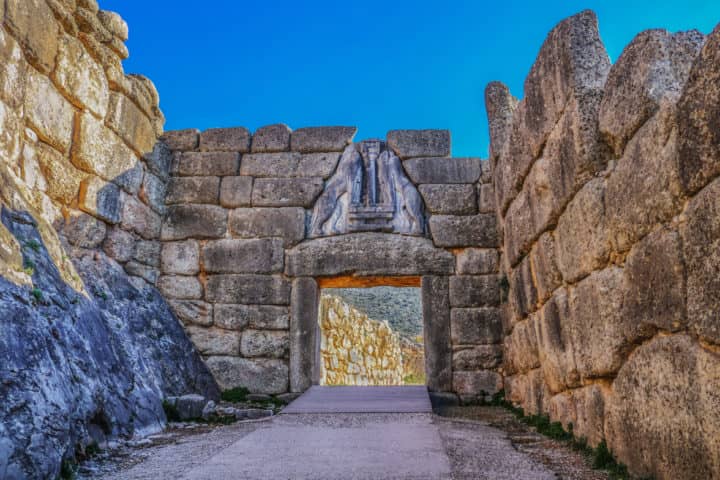 Although Michael Ventris wasn’t Greek, he played an important role in Greek history. A talented British linguist, he was fascinated with ancient languages, including the language spoken by the Mycenaeans, who resided in mainland Greece. He was an Englishman and passed his childhood in both Switzerland and England and most likely never set foot in Greece. His name, however, is forever connected to Greece and Greek culture because of his accomplishments with Linear B, the ancient script left behind by the Mycenaeans. Here’s more information about him:
Although Michael Ventris wasn’t Greek, he played an important role in Greek history. A talented British linguist, he was fascinated with ancient languages, including the language spoken by the Mycenaeans, who resided in mainland Greece. He was an Englishman and passed his childhood in both Switzerland and England and most likely never set foot in Greece. His name, however, is forever connected to Greece and Greek culture because of his accomplishments with Linear B, the ancient script left behind by the Mycenaeans. Here’s more information about him:
Michael Ventris’ Early Years
Michael Ventris was born in England and spent the early years of his life in Switzerland. The son of a British soldier and Jewish Polish mother, Michael was an only child. This description of Michael’s early childhood and ethnic heritage provides a clue to one of the unique aspects of his youth – his affinity for languages. In addition to English, young Michael learned French and German while in Switzerland as well as Swiss German. He also learned to speak Polish conversing with his mother. After returning with his family to England around the age of nine, Michael would go on to study Latin and some classical Greek and would continue to learn languages, including Swedish and Russian, as an adult.
Discovering Linear B
This affinity for language likely served to develop Michael’s interest in ancient languages. He read a book on Egyptian Hieroglyphics when only seven years old. A critical moment in the life of Michael Ventris occurred in 1936 when Michael was 14. In that year, Burlington House in London hosted an exhibition of Cretan archaeology with tours led by the great British archaeologist Arthur Evans. Michael’s school attended the exhibition and participated in one of the tours led by the famed Evans. During the tour, Arthur Evans held up tablets with the unknown ancient writing system known as Linear B. Young Michael was captivated to hear that Linear B had yet to be deciphered. This event was a turning point in the young man’s life. Four years later, Michael would write an article published in the American Journal of Archaeology speculating that the language of Linear B was related to Etruscan, a pre-Roman language of Italy.
His Accomplishments
Michael Ventris would go on to study architecture at the Architectural Association School of Architecture in London beginning in 1940. Interrupted by the war, Michael would serve in the Royal Air Force and not finish his architectural degree until after the war. Architecture, however, was not to be his primary interest.
In 1950, Michael again began working on Linear B. This time, however, he had additional information due to subsequent discoveries of Linear B tablets in mainland Greece. Comparing the more recent tablets from the Greek mainland to the earlier tablets from Crete allowed Michael to deduce that some of the symbols were place names on the island of Crete.
This turned out to be correct and allowed Michael to successfully decipher Linear B. As a result of Michael’s achievement, Linear B was confirmed as a Greek dialect and this finding established the Greek language as a much older language than originally thought by scholars.
Michael Ventris died in a car crash in 1956 but his main achievement continues to resonate with scholars of Greek history to this day. His discovery established a new depth to our historical perspective of the Greek language and culture and without him, we may not have the understanding of the Mycenaean’s language that we do today.
Source:

